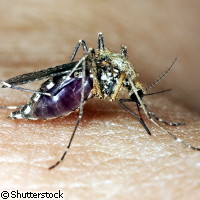Lockdown on malaria
A groundbreaking UK-US study may give researchers worldwide the tools they need to contain the spread of malaria, a disease that can have fatal consequences. Published in the journal Science, the research was funded in part by the EU through the MALSIG ('Signalling in the life cycle stages of malaria parasites') project, which received EUR 3 million under the Heath Theme of the Seventh Framework Programme (FP7) to boost understanding of the biology of malaria parasites. In the latest study, led by a team from the Harvard School of Public Health (HSPH) in the US, the scientists initially sought to prevent malaria parasites from invading healthy red blood cells. What they actually did was stop the parasites in their tracks within infected blood cells. To achieve this result, the researchers identified and eliminated a protein - the calcium-dependent protein kinase (PfCDPK5) - in the world's most common yet severest malaria parasite, Plasmodium falciparum. By removing the protein, the scientists succeeded in imprisoning the parasites within the infected cells, preventing them and many of their offspring from entering other healthy blood cells. 'This is the stage where things have to happen very fast for the parasite,' explained HSPH Professor Manoj Duraisingh, senior author of the study. 'The parasite doesn't like to spend much time outside the cell. It grows and matures, and immediately following rupture, enters a new cell. It was a surprise that this protein kinase, which we thought would be involved in red blood cell invasion, turns out to be essential for the parasite getting out of the cell.' According to the researchers, their findings provide insight into the highly choreographed process of the parasite's entrance into and exit from a blood cell. 'When the parasite gets out of the red blood cell, it has a matter of seconds or minutes to get into new red blood cells, or it will be cleared or killed by the human immune system,' pointed out lead author of the study, HSPH's Dr Jeffrey Dvorin. 'We found an important trigger for the parasite to exit cells that may be independent from the invasion trigger.' The researchers noted that humans do not carry the kinase protein under investigation; only parasites and plants do. Consequently, developing a drug targeted to that protein could possibly be less toxic to humans. Dr Dvorin said a number of businesses and laboratories are investigating potential inhibitors of the parasite's entrance into and exit from red blood cells. However, he noted that no anti-malarial drugs have been developed that target these stages of the parasite's lifecycle. The team also succeeded in producing a scientific tool for researchers conducting vaccine trials of mature invasive parasites. 'One of the experiments in the paper mechanically releases the parasites, which have matured into virulent and invasive forms,' said Dr Dvorin. 'People have been trying to get viable parasites in this form for study. This is a great resource for vaccine studies.' Malaria impacts the lives of up to 500 million people worldwide each year; 1 million of those, many of them children from sub-Saharan Africa, succumb to the disease. Symptoms include high fevers, anaemia and shaking chills. One of the biggest challenges facing researchers is the fact that malaria's resistance to drug treatment continues to strengthen. Contributing to this study were researchers from the London School of Hygiene and Tropical Medicine (UK), the National Institute for Medical Research (UK), Children's Hospital Boston (US), the Broad Institute (US), Stanford University (US), the Scripps Research Institute (US), and the Genomics Institute of the Novartis Research Foundation (US). The MALSIG project, which is coordinated by France's Institut national de la santé et de la recherche médicale (INSERM), brings together experts from France, Germany, India, Italy, the Netherlands and the UK. The project began in 2009 and will end in 2012.
Countries
Germany, France, India, Italy, Netherlands, United Kingdom, United States



